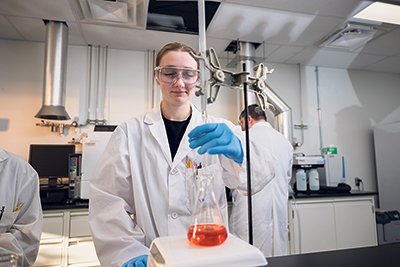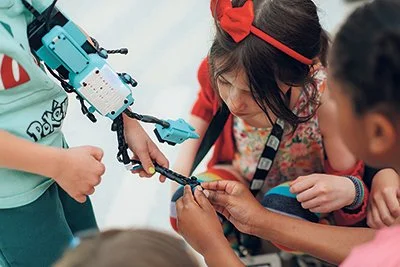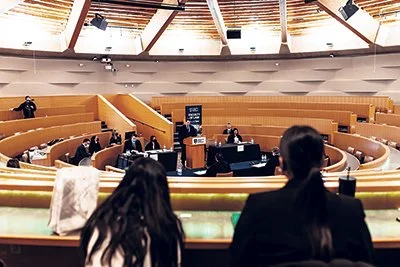As Canada faces a number of significant challenges including economic uncertainty, post-secondary education plays a vital role in improving outcomes – and helping learners, industry, communities and society overall adapt to changing conditions.
Read MoreAmii turns breakthroughs into meaningful action, deploying responsible technology to benefit our health, environment and communities
Read MoreAdvancing a resource project from exploration to production requires steps that range from securing financial and community support to navigating regulatory requirements. Almost inevitably, the process is lengthy, with various factors determining progress.
Read MoreOn a Canadian investment landscape increasingly defined by a search for lower costs and greater control, exchange-traded funds (ETFs) are cementing their status as the dominant growth engine.
Read MoreIn the face of a changing relationship with our southern neighbour, Canada is on the cusp of rewriting its trade, defence and infrastructure story for the next century. This will mean new investments and opportunities as the country aims to make itself more efficient and productive. Economic prosperity will rely, first and foremost, on enterprising Canadians putting their skills to work.
Read MoreBranksome Hall is a leader in science, technology, engineering, arts and math (STEAM) education, with programs, curriculum and partnerships that foster creativity, problem-solving and critical thinking in its students.
Read MoreTranslating a language of life into novel diagnostic and therapeutic tools at Wilfrid Laurier University
What are some of the signals associated with the building blocks of life that enable our bodies to function? And how can better understanding them help us detect and address problems like cancer?
Read MoreWhat if you could donate to a charity of your choice and – at the same time – support the local resource industry?
Accelerating philanthropic impact and mineral exploration with flow-through share financing
Across Canada, there is a heightened focus on advancing resource sovereignty, with a spotlight on the critical minerals needed for energy security.
Read MoreClimate change will create new security challenges and magnify existing ones in Canada and around the world, according to a comprehensive defence review published by the government last year.
Read MoreOn this Earth Day, the significance of forests for conservation, community benefits and human health has never been more urgent to acknowledge. Forests play many critical roles for nature and people: they provide habitat for hundreds of species, act as water filters, reduce air pollution, and are places of community connection, recreation and refuge. They regulate temperature and weather patterns, and remove carbon dioxide from the atmosphere.
Read MoreStudents entering a law degree program have already proven their considerable intellectual capacity by obtaining a first degree, achieving a high grade-point average and passing the LSAT.
What awaits them at Thompson Rivers University (TRU) is a rigorous three-year, 60-credit course, where a strong foundation of knowledge of the law is complemented by ample opportunity to practise skills and competencies outside the classroom, says Daleen Millard, dean of TRU’s Faculty of Law.
Read MoreBuffeted by external and internal pressures, Canada’s mineral industry faces a precarious moment. At a time of an escalating trade conflict with the U.S. and resulting economic uncertainty, the sector is also subject to intensifying tax pressures, stricter foreign investment rules and mounting regulatory challenges from within Canada.
Read MoreGone are the days when green building was merely a feel-good initiative. It is now becoming a vital component of risk management and a competitive advantage in commercial real estate, and it is achievable. The business and policy environment has evolved around new energy efficiency measures, advanced building materials and smart technologie
Read MoreData-driven decision-making can help to improve outcomes for any project or business – and bring benefits for reducing risks and errors, improving efficiency and resource allocation – and enhance transparency and scalability.
Read MoreMedical isotopes have been the cornerstone of nuclear medicine for decades, but ongoing research is expanding the boundaries of how physicians can identify and treat disease, says Dr. Christopher O’Brien, former president of the Canadian Association of Nuclear Medicine.
Read MoreTools for allowing farmers to select the best animals for resilient herds and sustainable beef production
An impressive array of tools – from data analytics and precision agriculture to livestock vaccines, crop development, genomic selection and more – is ushering in the future of farming.
Read MoreAccording to modelling by Clean Energy Canada, a climate and clean energy program within the Morris J. Wosk Centre for Dialogue at Simon Fraser University in British Columbia, and Navius Research, Canadian jobs in clean energy are set to grow 7 per cent a year, from 509,000 in 2025 to 2.7-million in a net-zero 2050.
Read MoreEcosystem and community health
Creating stronger outcomes, meeting community needs at the University of Northern British Columbia
From its base in Prince George, the University of Northern British Columbia (UNBC) is working to improve health outcomes in local communities, including in older populations, with an approach that integrates the health of people, communities and the natural environment. Beyond contributing to stronger and more resilient northern communities, these efforts are also contributing to advances in research and innovation at the society level.
Read MoreWith its decades-long record of delivering low-cost, safe and efficient energy supply, CANDU nuclear reactors are an existing solution to the urgent need for emission-free electricity generation, according to the recently launched Canadians for CANDU campaign.
Read MoreCanada’s airports are challenged to adapt to a quickly changing world. They need to upgrade aging infrastructure, invest in innovative technology and apply new solutions to serve the growing population of air travellers – all while minimizing environmental impact.
Read More



















